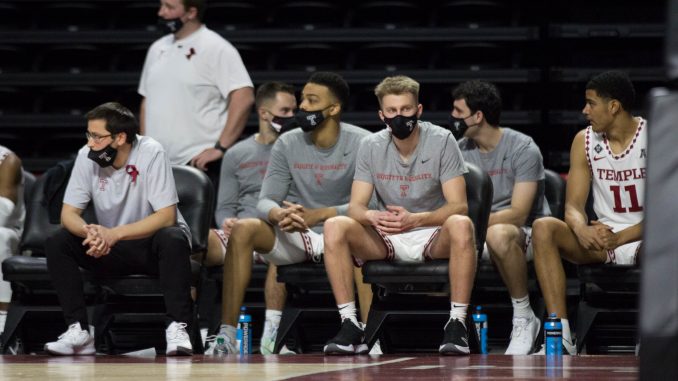
Before Temple University men’s basketball’s season even started, the team was faced with difficult obstacles sparked by the COVID-19 pandemic.
“You can’t really build chemistry on a Zoom call,” said senior forward J.P. Moorman II on Oct. 14, 2020. “You’ve got to hang out with guys and get in the gym with guys to get to know them.”
The 2020-21 NCAA basketball season is bringing unfamiliarity to the sport for more reasons than one. For Temple men’s basketball (4-8, 3-8 The American Athletic Conference), the most prevalent problem is the constant adjustments made to their schedule. Seven of the team’s games were postponed, and one was canceled.
The Owls’ original schedule was scrapped before it even started. On Nov. 26, 2020, just two days before the scheduled season-opening contest against Virginia Tech, Temple announced that a 14-day quarantine would be in effect due to a positive COVID-19 test within the Owls’ program.
The two-week period of isolation led to the cancellation of the Owls’ game against Villanova on Dec. 3, 2020, and the postponement of their Dec. 6, 2020, contest against La Salle.
“The health and safety of our student-athletes, coaches and staff is always the number one priority with our program,” wrote head men’s basketball coach Aaron McKie in a press release when the quarantine was announced. “Our medical staff and administration have done an incredible job of creating a safe environment for our team.”
In a sport where schedules are usually honored without fail, teams are struggling with the fluidity of this season’s scheduling. Nearly half of the Owls’ games have not taken place as scheduled this season.
The team has played games with limited time to practice and had to make quick changes to its travel schedule in order to get to new games. The Owls were scheduled to play East Carolina on Feb. 11 but the game was postponed, so they traveled to play Cincinnati on Feb. 12 instead.
“With the American conference a lot of teams are testing positive, and we have to reshuffle the deck, seems like we’re doing it every week now,” McKie said on Jan. 22. “We want to be one of those teams that’s readily available, so if we have to postpone a game we can get up and go or have someone come to us. In order for that to happen our guys have to stay out of harm’s way and just continue doing a great job of taking care of themselves.”
The Owls won their first game of the season after weeks away from the floor, but they haven’t had the same luck since. On four separate occasions, they dealt with midseason postponements, and in all four of those instances, they lost their first game following the postponement.
While McKie acknowledged the difficulty of dealing with a makeshift schedule, he believes it will help his players in the long run, he said.
“The turnaround is a little bit different for us,” McKie said. “It gives these guys the experience of understanding quick turnarounds and mental focus and all of the other things you need.”
Stopping and starting repeatedly is a difficult task for the Owls. A single postponement can lead to a layoff that in some cases lasts more than a week, making it difficult to stay in a rhythm, said senior forward De’Vondre Perry.
As the Owls continue their season, there is no telling how many games they will play, who their opponents will be and where the games will take place.
“Throughout this whole season, it’s been challenging,” Perry said. “Of course that’s tough, but we’re not looking for excuses.”


Be the first to comment